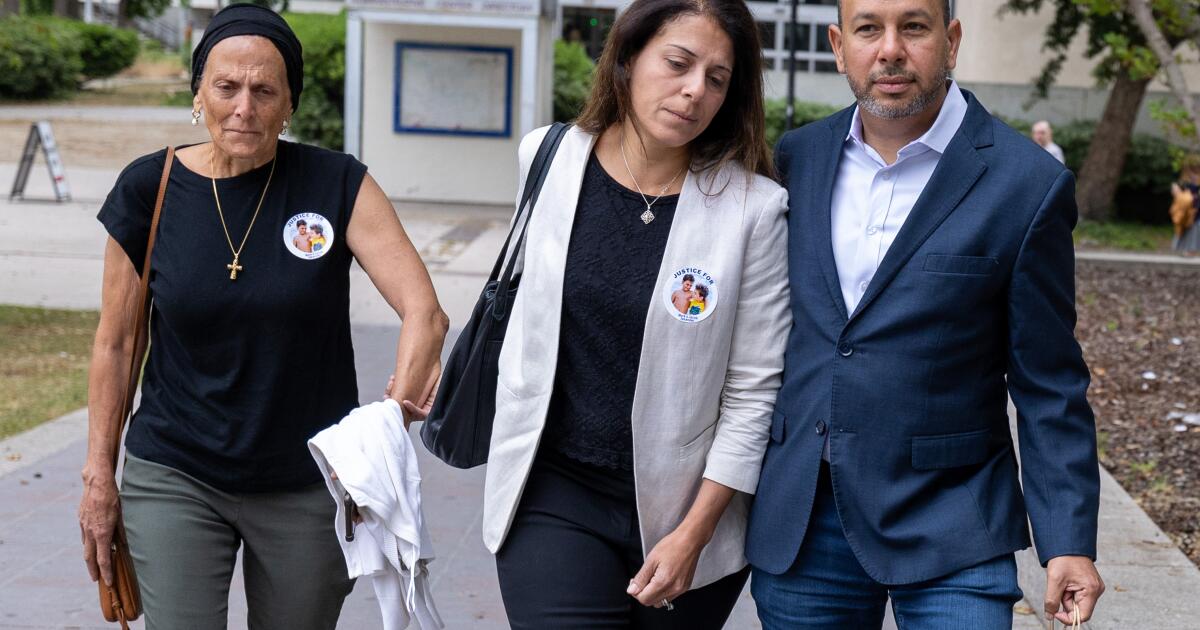
Two years after a Los Angeles County sheriff’s deputy was caught on camera slamming a handcuffed inmate’s head against a concrete wall, prosecutors have decided not to charge any of the jailers involved.
The District Attorney’s Office explained the move in a memo last month, saying prosecutors could not tell whether the violence was intentional because one deputy alleged it was actually the inmate’s “own momentum” that “caused his head to hit the wall.”
The decision comes a year after the American Civil Liberties Union of Southern California first made public a video of the incident at Men’s Central Jail. who posted a 15-second clip of it online. The Graphic monitoring Video Two deputies were shown talking An inmate came out of his cell with his hands already bound behind his back. It appears a deputy grabbed the inmate from behind and slammed him against a wall without provocation. Photos of his injuries show the man had a 3-inch-deep gash on his head.
This week, Peter Eliasberg, the ACLU’s lead counsel in two long-running class action lawsuits against the jails, condemned the district attorney’s decision not to prosecute the deputies.
“Standing alone, it is nothing short of pathetic,” he told the Times. “But when you combine it with the D.A.’s office’s history of encouraging criminal behavior by the Sheriff’s Department, it is outrageous.”
He said the ACLU plans to ask the U.S. Justice Department to take over the case because federal prosecutors have previously obtained convictions against other jail deputies whom district attorneys declined to prosecute.
The Los Angeles County district attorney’s office told the Times in an email that it “takes allegations of misconduct by a jail deputy extremely seriously” and reviews each case based on the evidence.
“The office has thoroughly reviewed the allegations in this case,” the email said, adding that prosecutors ultimately “concluded that the allegations could not be proven beyond a reasonable doubt.”
The sheriff’s department said in a statement Friday that both deputies are still with the department. Now that the district attorney’s office has handled the matter, sheriff’s officials will decide whether the deputies violated any policy or procedure.
“The department expects custody personnel to carry out their responsibilities in a professional manner, with integrity and compassion,” the statement said. “Anyone who fails to uphold our standards of care and violates department policy will be held accountable.”
The deputies did not respond to emailed requests for comment, and it was not immediately clear whether they had attorneys.
The 2022 incident took place in a high-security unit of Men’s Central Jail, where all inmates are handcuffed through a door slot before they can leave their cell. Whenever they do come out, policies require them to be escorted by two deputies “who are required to maintain a firm grip on the inmate.”
ACLU lawyers said it was the same unit that later became the center of other problems. On Wednesday, The Times reported that inspectors caught eight deputies in the high-security unit Watching “sexually explicit videos” Instead of caring for a prisoner who committed suicide.
An inspector described the unit as “moldy” and damp and said the people living there did not have books or pens. “They have absolutely nothing, and it’s completely dark,” Inspection Commissioner Haley Broder said in an interview. “After being in there for 30 minutes, I don’t know how anyone could have survived.”
According to the D.A.’s memo, The inmate seen in the surveillance video — whose name was redacted — was placed in that high-security unit because he had previously threatened to stab policemen and had a “long history” of attacking people.
The memo states that on July 4, 2022, deputies Jose Peralta and Johnathan Gutierrez went to the unidentified inmate’s cell and took him to the shower. After they handcuffed him and he left the cell, deputies said he told them: “Don’t touch me.”
Because the surveillance video has no sound, it’s not possible to tell what — if anything — the three men said to each other. But according to the DA’s memo, Peralta claimed the inmate threatened to punch Gutierrez in the head.
According to Gutierrez, according to the memo, as soon as the inmate got out of his cell, he turned toward the shower, making a “sudden movement” that startled the deputy. Gutierrez grabbed the inmate’s arm and extended his hand up to his shoulder. Then, he alleges, the inmate “leaned his upper body forward.”
Gutierrez said it all happened so fast that his sole focus was on controlling the inmate. According to the memo, the deputy said his right hand went to the back of the inmate’s head as the man advanced.
“It was his own momentum that caused his head to hit the wall,” Gutierrez wrote in a use-of-force report, which prosecutors quoted in their memo.
Eliasberg called this account “categorically false.”
When investigators questioned the inmate a few hours after the incident, he also disagreed with the police officers’ description, and did not say anything about being threatened with a blow to the head—but said that police officers had threatened him before.
“I was walking out, the police pulled me out, and I stepped forward, and he hit me right in the forehead,” he said, according to the memo. “That’s all I remember. Because the police told me yesterday that once they get me out of the cell, they’re going to arrest me.”
He told investigators he was taking psychiatric medication and believed he experienced telepathy, the memo said. When he could not stay on topic, investigators cut the interview short.
The memo said the police officers did not provide voluntary statements to investigators, though both wrote use-of-force reports that prosecutors analyzed when evaluating the case.
Prosecutors wrote that to prove the deputy committed a crime, they would have to show the force was intentional, unlawful and “not in self-defense.” But they said the video confirmed the inmate made some “abrupt movements” and “began moving his body toward the wall before Gutierrez grabbed him by the back of the neck.”
Prosecutors added that the video footage could not determine whether Gutierrez intentionally slammed the inmate against the wall or whether it was “accidental,” concluding they did not have enough evidence to pursue the case.
Corrine Kendrick, another ACLU attorney involved in prison lawsuits, called the argument “mind-boggling,” saying whether the slam was intentional should be left to a jury.
“Whether or not the officers intentionally hit the man’s head against the wall, or whether his head somehow hit the wall as they’re claiming, is something a jury will have to determine,” he said. “It’s really amazing they would think there wasn’t a crime committed here. If an incarcerated person had hit an officer’s head against a wall and caused injuries, I don’t think the district attorney’s office would refuse to prosecute.”
Nearly a decade earlier, the ACLU leveled similar allegations in a scathing letter to then-DA Jackie Lacey in July 2015. The letter focused on local prosecutors’ failure to charge a group of deputies who beat and pepper-sprayed a visitor they claimed attacked them in 2011.
Initially county prosecutors charged the visitor — Gabriel Carrillo — with assault on a peace officer and other offenses, but said there was “no evidence to suggest the police officers acted inappropriately.”
After the US Attorney’s Office took over the case, Federal prosecutors secured criminal convictions against five deputiesTwo of them admitted in court that Carrillo was in fact handcuffed at the time of the attack. Eventually, Carrillo sued and The case was settled for $1.2 million.,
According to the ACLU’s letter, the Carrillo case was part of a larger pattern. The civil rights organization said the District Attorney’s Office was quick to file charges against inmates — often without reviewing video evidence — but “almost never” filed charges against deputies.
Eliasberg said this week that very little has changed.
“This is further evidence of the DA’s unwillingness to provide accountability for criminal behavior by law enforcement,” he said. “The ACLU will quickly call on the US DOJ to investigate and prosecute this incident as it did in 2011 and 2012.”
Currently, the Sheriff’s Department is subject to several consent orders stemming from federal lawsuits. One, a case known as Rosas v. Luna, began in 2012 when inmates alleged that “abusive, brutal, and cruel deputy assaults on inmates” had become a common occurrence. The lawsuit alleged that many of the beatings by deputies were “far more severe than the infamous 1991 beating of Rodney King.”
After three years of legal battles, the inmates — who were represented by the ACLU — and the county agreed in 2015 that the Sheriff’s Department would make some specific changes to reduce the number of assaults behind bars.
Nearly a decade later, there are some signs of improvement, as county data shows jailers punch inmates in the face much less often than they used to. But the department has yet to comply with all the terms of the agreement. The case is still ongoing.















